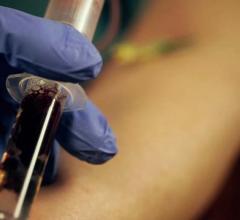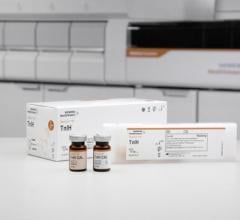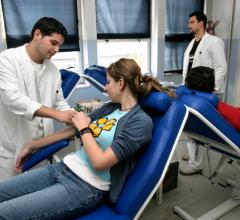
January 4, 2017 — A high-sensitivity blood test could be used to predict which patients are at risk of a heart attack according to new research funded by the British Heart Foundation (BHF).
The study, published in the Journal of the American College of Cardiology, shows the troponin test – currently used to help diagnose a heart attack - could also be a more effective way of assessing future heart disease risk than blood pressure or cholesterol.
As a result, the researchers say the test could more precisely identify people who will benefit from statins, and assess the impact that statins are having in lowering someone’s heart disease risk.
Coronary heart disease — the cause of heart attacks — is the United Kingdom’s single biggest killer, accounting for nearly 70,000 deaths in the U.K. each year. When heart muscle is damaged it leaks a protein called troponin into the blood stream. Patients suspected of suffering a heart attack will often be given a troponin test to aide diagnosis, but until now the test has not been used to assess future heart attack risk.
In this study of over 3,000 men with high cholesterol but no history of heart disease, the team found that changes in blood levels of a high-sensitivity troponin test from Abbott Diagnostics accurately predicted the risk of a person suffering a heart attack or dying of coronary heart disease up to 15 years later.
Troponin improved the prediction of coronary heart disease risk, adding to traditional markers such as cholesterol levels and blood pressure. If borne out in larger, more diverse studies, doctors may be able to use the troponin test to determine which patients are most likely to develop coronary heart disease.
The researchers from the University of Edinburgh and University of Glasgow also found that by measuring levels of troponin in the blood they could tell which patients were responding to the statins used to treat them.
Remarkably, taking a statin reduced troponin levels. Those whose troponin levels decreased the most had a five-fold lower risk of heart attack or death from coronary heart disease compared with those who troponin levels were unchanged or increased. A decrease in troponin could indicate treatment is effective, whereas any increases in blood troponin could prompt a change in treatment strategy.
Statins are used to prevent coronary heart disease in people who are considered high-risk, but more accurate risk assessment could help doctors target treatment to those who need it most. Statins are currently recommended for patients considered at high risk of cardiovascular disease based on traditional clinical indicators. Higher levels of troponin may reflect “silent” coronary artery disease, and identify those at greatest risk who could benefit from targeted therapy.
While encouraging, these results were obtained in a population of middle-aged men with high blood cholesterol. Further work to see whether the same effects are seen in women and men with lower cholesterol levels will need to take place before the test can be used in clinical practice.
Prof. Nicholas Mills, BHF senior clinical research fellow at the University of Edinburgh, who led the research, said, “These results are tremendously exciting, and could revolutionize the way we manage patients at risk of coronary heart disease.
“Whilst blood cholesterol levels and blood pressure are important and associated with the risk of developing heart disease, troponin is a direct measure of injury to the heart. Troponin testing will help doctors to identify apparently healthy individuals who have silent heart disease so we can target preventative treatments to those who are likely to benefit most.”
For more information: www.onlinejacc.org


 October 09, 2019
October 09, 2019 









